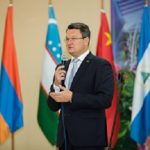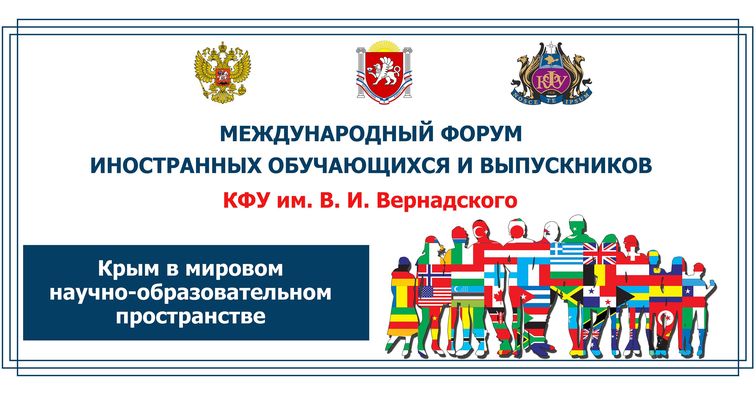There are more than 2,000 international students currently studying in Crimean universities. They represent 50 countries, including India, Uzbekistan, Ukraine, Kazakhstan, Nigeria, Palestine, Tajikistan, Turkmenistan, Ghana, Zimbabwe, Bangladesh, Congo, Belarus, Azerbaijan, Egypt, Jordan, and many others. Thus, the traditions that have been established on the peninsula back in the middle of the 20th century, when Crimean higher education institutions welcomed their first international students, are being continued to this day. Since then, over 25,000 international students from nearly every continent and almost all UN member states have graduated from Crimean universities.
Our graduates are employed across the globe. Their professionalism is the best evidence of the region’s educational potential. At the same time, our alumni serve as ambassadors of the Russian World and the Russian Crimea in their countries, where they reveal the truth about what’s actually happening on the peninsula that currently is at the epicentre of the global geopolitical processes.
International alumni of Crimean universities formed their own association. Graduates from Crimean universities in Vietnam, Cuba, and Jordan launched similar informal groups in their countries. We keep in touch with our graduates who are currently working in India, China, Canada, Costa Rika, and other countries.
During their time at Crimean universities, international students learn about the history and culture of Russia and Crimea, acquire Russian language skills, and take an active part in public life. That is one of the important traditions of our national higher education that must not be lost for the sake of pure commercialisation. Fortunately, in recent years, a shift away from perceiving education as a service sector is emerging in Russia, which, we are confident, will lead to positive outcomes and contribute to the enhancement of the international standing and profile of our country.
Today, despite all the Western sanctions and pressure, Crimea retains its position as a major international centre for research and education that has partners all over the world.
For seven and a half years now, the USA and their allies have been refusing to recognise Crimea as part of Russia and acting to isolate the peninsula internationally, which, among other areas, impacts education and research. Crimean higher education institutions are deprived of the opportunity to join international study programmes such as Erasmus Mundus, DAAD and others. Our faculty and students are denied visas to the USA, UK, and Schengen Area countries on the pretext that Crimea is part of Ukraine. There are attempts to question the legitimacy of diplomas from Crimean higher education institutions. The Ukrainian authorities do their best to trace our international contacts and put an end to them through diplomatic protests.
The blockade of Crimea in the areas of education and research is being enforced along with the disruptions in transportation and energy and water supply to the peninsula, which also have been initiated to reduce the quality of life in the region and provoke discontent with the Russian authorities. Like any other similar measure, this blockade is doomed to fail.
While creating certain challenges, the Western sanctions fail to do irreparable damage to Crimea and Russia. On the contrary, they serve to discredit the West and Ukraine in the opinion of those who live in or visit Crimea, including our international students. While calling for freedom and democracy, the USA and their allies, in fact, break fundamental human rights for freedom of movement and travel, freedom for education, and others. The Western sanctions that impact education and research are actually the instruments in the hybrid warfare against Russia.
We have been proved right by time. This is the fifth annual international forum ‘Crimea in the Global Research and Education Community’. Over these years, we have managed to maintain and increase the region’s potential in education and research; we have implemented a number of international projects in cooperation with our partners from China, Vietnam, India, Iran, Israel, Greece, Cyprus, and other countries.
We believe that sooner or later the USA and their allies will change their policy of double standards. At the same time, we declare that we will be able to do without cooperating with them if we have to. Being part of Russia, Crimea is a self-reliant and internationally renowned centre for education and research that no one can destroy.
Today, Crimea is a safe region that provides all necessary conditions and environment for the development of science and research and delivery of up-to-date and high-quality education in almost all fields that are in demand globally.
Under the present circumstances, V.I. Vernadsky Crimean Federal University has changed its geographic and geopolitical priorities. The University’s international efforts and initiatives are focused primarily on the former Soviet Union countries, India, China, the Middle Eastern and African countries. Crimean higher education institutions are able to overcome all the challenges they face, including sanctions and the pandemic. The university has taken all reasonable measures to prevent the spread of the novel coronavirus, and developed remote learning practices that are being effectively implemented along with traditional educational methods.

